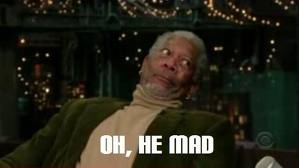One common criticism of the libertarian ethos is that if we reduce government control over society, big business will have unchecked power over our lives, so that we will merely be trading one type of control for another.
But concern with corporate power is not inconsistent with libertarianism, as Clark illustrated in his post on left-libertarianism. The difference between libertarians and traditional conservatives might be this: conservatives believe that government interference impedes business and by extension individuals, while some libertarians believe that government also empowers and excuses abuse of individuals by favored business partners.
Take First National Bank of Wellston, Ohio and its encounter with Katie Barnett.
If Katie Barnett had broken into somebody's house and stolen all their possessions and changed their locks, she would likely be arrested and charged with a crime. She would be required to pay the homeowner for the possessions she stole, at a minimum, and the courts would have rather little patience for her protests that their stuff wasn't worth as much as they said. (My experience as a criminal defense attorney is that judges look very unfavorably on the "the property I stole/defrauded/destroyed is overvalued and I shouldn't have to pay that much; let them replace it with something cheaper" argument.)
But Katie Barnett didn't burglarize a house; she's an honest person. First National Bank of Wellston burglarized Katie Barnett's house through its own incompetence or the incompetence of its agents. First National Bank was trying to repossess a foreclosed house to sell it, and because its agents (1) decided to find the house by GPS, and (2) didn't know how to use a GPS, they invaded Katie's house, changed the locks, and disposed of her possessions. Katie's house wasn't being foreclosed upon; she's not a customer of that bank.
Katie Barnett has asked First National Bank of Wellston to pay her for the possessions it sole and disposed of. First National Bank of Wellston, through its CEO Anthony S. Thorne, claims that it isn't paying because Katie's reimbursement list doesn't match the records that its employees kept of what they took and disposed of. Those would be the same employees who tried to find a house using GPS, failed, burglarized the wrong house, and disposed of Katie's possessions, in case you were wondering. Mr. Thorne and First National Bank nonetheless regards them as very reliable record-keepers.
Mr. Thorne is also demanding receipts for Katie's things, and has told her the bank "isn't paying retail." Katie, like many people, doesn't keep receipts for everything, not anticipating that a bank will burglarize her house. Moreover, to the extent she does keep receipts, she keeps them in her house, because once again, she fails to anticipate that a bank will break into the house, take her receipts, throw them away, and then demand that she produce them. Katie also failed to anticipate that someone could burglarize your house and, when called upon to pay you so you can replace your things, sneer that replacements from a second-hand store are good enough for you.
The McArthur, Ohio police refuse to get involved. Would they get involved if Katie burglarized a house? Yes they would. Would they get involved if Katie ran off with someone's stuff and refused to repay? Yes they would. Will they get involved when a bank — a reliable crony of government — burglarizes a house and drags its feet on repaying the victim? No they will not. The government exercises its police power to protect banks — say, by prosecuting someone who draws anti-bank slogans in kids' chalk on the sidewalk — but generally is extremely to exercise its police power to impose consequences on banks, which have money. That is a result of the natural relationship between government power and private-crony power.
The bank doesn't act based on what's right. And the police? Don't be ridiculous. But they might respond to public pressure. You can reach the local police here and the bank here. Be civilized, even if they — by any rational definition of that term — are not. You might also consider spreading upon the internet the names of the First National Bank of Wellston and its CEO Anthony S. Thorne, so that people can make an informed decision about whether to treat with them.
We have choices about how to react to this sort of thing. Some people say that the answer is more regulation and more laws permitting recourse to the courts, so that banks might be deterred and that people like Katie Barnett might secure legal redress. Other people view that response as paradoxical: by the nature of power — any increase in government authority will tend to make things like this more likely, not less likely, because government actors will always have rich cronies.
Want To Burglarize A House With Impunity, Then Nickle-And-Dime The Restitution? It Helps To Be A Bank. © 2007-2013 by the authors of Popehat. This feed is for personal, non-commercial use only. Using this feed on any other site is a copyright violation. No scraping.





![260rem[1]](http://vuurwapenblog.com/wp-content/uploads/2013/04/260rem1-1024x682.jpg)


